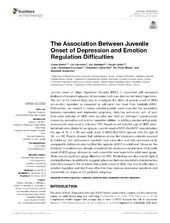| dc.contributor.author | Visted, Endre | |
| dc.contributor.author | Sørensen, Lin | |
| dc.contributor.author | Vøllestad, Jon | |
| dc.contributor.author | Osnes, Berge | |
| dc.contributor.author | Svendsen, Julie Lillebostad | |
| dc.contributor.author | Jentschke, Sebastian | |
| dc.contributor.author | Binder, Per-Einar | |
| dc.contributor.author | Schanche, Elisabeth | |
| dc.date.accessioned | 2020-02-17T08:38:37Z | |
| dc.date.available | 2020-02-17T08:38:37Z | |
| dc.date.issued | 2019-10-18 | |
| dc.Published | Visted E, Sørensen L, Vøllestad J, Osnes B, Svendsen JL, Jentschke S, Binder P-E, Schanche E. The Association between Juvenile Onset of Depression and Emotion Regulation Difficulties. Frontiers in Psychology. 2019;10:2262. | eng |
| dc.identifier.issn | 1664-1078 | |
| dc.identifier.uri | https://hdl.handle.net/1956/21419 | |
| dc.description.abstract | Juvenile onset of Major Depressive Disorder (MDD) is associated with increased likelihood of recurrent episodes of depression and more detrimental clinical trajectories. The aim of the current study was to investigate the effect of juvenile onset of MDD on emotion regulation as measured by self-report and Heart Rate Variability (HRV). Furthermore, we wanted to assess whether juvenile onset impacted the association between rumination and depressive symptoms. Sixty-four individuals with at least three prior episodes of MDD were recruited and filled out self-report questionnaires measuring rumination and emotion regulation abilities. In addition, electrocardiographic assessments were used to calculate HRV. Based on self-reported age of MDD onset, individuals were divided in two groups: Juvenile onset of MDD (first MDD episode before the age of 18, n = 30) and adult onset of MDD (first MDD episode after the age of 18, n = 34). Results showed that individuals whose first depressive episode occurred in childhood and adolescence reported more rumination and less emotional clarity compared to individuals who had their first episode of MDD in adulthood. Moreover, the tendency to ruminate was strongly associated with depressive symptoms in the juvenile onset of MDD group, whereas no such association was found in the adult onset group. There was no significant group difference for HRV. The findings are discussed in light of existing literature, in addition to suggesting how our findings may inform clinical practice and future research. We conclude that juvenile onset of MDD may lead to difficulties in emotion regulation and that these difficulties may increase depressive symptoms and vulnerability for relapse in this particular subgroup. | en_US |
| dc.language.iso | eng | eng |
| dc.publisher | Frontiers | eng |
| dc.rights | Attribution CC BY 4.0 | eng |
| dc.rights.uri | http://creativecommons.org/licenses/by/4.0/ | eng |
| dc.subject | Emotion regulation | eng |
| dc.subject | Rumination | eng |
| dc.subject | Emotional clarity | eng |
| dc.subject | Depression | eng |
| dc.subject | Recurrent depression | eng |
| dc.title | The Association between Juvenile Onset of Depression and Emotion Regulation Difficulties | eng |
| dc.type | Peer reviewed | |
| dc.type | Journal article | |
| dc.date.updated | 2019-10-24T08:58:54Z | |
| dc.description.version | publishedVersion | |
| dc.rights.holder | Copyright 2019 Visted, Sørensen, Vøllestad, Osnes, Svendsen, Jentschke, Binder and Schanche. | eng |
| dc.identifier.doi | https://doi.org/10.3389/fpsyg.2019.02262 | |
| dc.identifier.cristin | 1739517 | |
| dc.source.journal | Frontiers in Psychology | |

